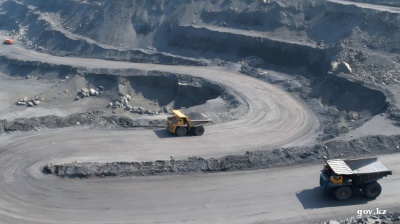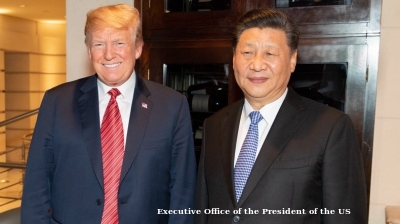Moscow is ready to begin peace talks on bringing the war in Ukraine to a halt, according to ex-Chancellor Gerhart Schroeder, who has just spent the last few days in Moscow and met with Russian President Vladimir Putin.
Schroeder says Russia is willing to resume talks with Kyiv on a negotiated peace deal and halt the fighting.
Schroeder is a close friend of Russian President Vladimir Putin and flew to Moscow last week in a private capacity. presidential spokesman Dmitry Peskov confirmed that Schroeder had met with Putin while in Moscow.
Schroeder flew to Moscow shortly after the war started, also in a private capacity, and met with Putin then to lobby for an end to the war.
“The good news is that the Kremlin wants a negotiated solution,” Schroeder said in an interview with the German magazine Stern after his return from Moscow.
The former Chancellor pointed to the recent Istanbul grain deal signed on July 22 that allows Ukraine to resume its exports as a sign of Russia’s willingness to compromise.
Schroeder’s message was echoed by presidential spokesman Dmitry Peskov, who told Russian media that the Kremlin is ready for a deal, if Ukraine is willing to concede to Russia’s demands.
“Russia is ready [for a peace deal], the Ukrainian side is well aware of our terms. One way or another, they will be fulfilled,” Peskov told journalists.
Schroeder suggested that Ukraine make territorial concessions that would see Donbas become semi-autonomous in a “Swiss canton model”, which is similar to the proposed Minsk II agreement arrangement that was championed by French President Emmanuel Macron in February as a possible solution to the political crisis then.
Peskov said that the two sides were close to a peace deal in late March as a result of several rounds of talks held in Belarus and then by video conference, but the talks collapsed after Kyiv accused Moscow of committing war crimes and massacring civilians in Bucha on the outskirts of Kyiv.
Schroeder also said that “armed neutrality” for Ukraine would be an alternative to Nato membership – an idea that Ukrainian President Volodymyr Zelenskiy himself suggested after conceding that Ukraine would never be allowed to join Nato in the first weeks of the war, when a rapid ceasefire still seemed possible to halt the invasion.
Ukraine also should give up all claims on the Crimea as part of any deal, said Schroeder. “The idea that the Ukrainian President Zelenskiy will reconquer Crimea militarily is just absurd,” he told Stern.
Finally, completing what must be Putin’s wish-list, Schroeder also called on Europe to allow the launch of Nord Stream 2, the second of two gas pipelines that run from Russia’s giant Yamal gas fields under the Baltic Sea to Germany.
German Chancellor Olaf Scholz supported the launch of the pipeline, that would bring ample supplies of cheap Russian gas directly to Germany’s shore, right up to the day of the invasion but killed the project off only days after the war started by withdrawing key documents without which it is impossible to certify the pipeline.
Since then Gazprom has uncovered “technical problems” with some turbines in the compressor stations and reduced the flow of gas to a mere 20% of Nord Stream 1 capacity, which threatens to cause a major energy crisis this winter. As one of his many jobs for the Russians, Schroeder served as chairman of Nord Stream AG that runs both pipelines.
“If things really get tight, there is this pipeline, and with both Nord Stream pipelines there would be no supply problem for German industry and for German households,” he said.
Scholz visited a site in Muelheim an der Ruhr in north-western Germany together with Siemens Energy executives on August 3, where the broken turbine in question is currently awaiting shipment to Russia. The turbine is "ready for onward transport to Russia," the German press reported Siemens Energy staff as saying ahead of the visit.
Despite the peace overtures, tensions remain high.
Kyiv is in no mood for talks and certainly will not concede to any of Russia’s demands. 84% of Ukrainians are against peace with Russia if it involves territorial concessions. According to a Kyiv International Institute of Sociology (KIIS) survey published on July 27, only 10% of Ukrainians are ready for some territorial concessions. “Even among residents of the eastern oblasts, where intense fighting is ongoing, 77% of people are against concessions,” the report reads.
Bankova’s line has hardened considerable since the Bucha massacre. "Ukrainians are not ready to give away their land, to accept that these territories belong to Russia. This is our land," Zelenskiy told CNN in an interview in July.
He added that he saw no other security guarantees for his country, other than Nato membership, backtracking on earlier comments in March that Ukraine would give up on its Nato ambitions and return to its pre-2014 neutrality, as enshrined in the Constitution at that time. He told CNN that the West’s decision to refuse Ukraine Nato membership was “wrong.”
The Russian Defence Ministry accused the US of being directly involved in the military campaign against Russian forces in Ukraine on August 3 after Ukrainian officials confirmed that Kyiv’s army was working together with the US military.
The deputy leader of the Main Intelligence Directorate of Ukraine’s Ministry of Defence, Vadym Skibitsky, told The Daily Telegraph that US troops had assisted with the targeting of the US-supplied HIMARS rocket systems, but added that the US was not providing specific live targeting information to Ukraine and effectively has a veto over Ukrainian missile strike targets. Russian defence officials seized on the interview as evidence that the US was directing the Ukrainian military effort.
“This undeniably proves that Washington, contrary to White House and Pentagon claims, is directly involved in the conflict in Ukraine,” Russia’s defence ministry said in a statement, adding that the Biden administration was directly responsible for civilian deaths in the Donbas region fired by the Ukrainian forces against residential areas there. Some attacks have indeed targeted civilian objects in the cities in Donbas controlled by separatist forces and independently confirmed by outside sources.
War progress
Schroeder’s call for peace comes as both Ukraine and Russia claim to have made strategic advances in the last week.
Russia says that it has captured the strategic city of Avdiivka near the Russian-held city of Donetsk, a key goal for Moscow, which is trying to take control of the greater Donbas region. It has already taken control of the Luhansk region, but still only controls just over half of the adjacent Donetsk region. Ukraine’s forces have controlled Avdiivka since 2015, which is heavily fortified. Ukraine’s armed forces denied the Russians had captured the city, although admitted it was under heavy bombardment.
A second battle is raging around the city of Kherson to the north of the Crimea peninsula, occupied by Russia in the early days of war and Russia’s only asset on the western bank of the Dnieper River. Ukraine has shelled the bridge across the river, making it very hard for Russia to resupply the occupied city and Ukrainian authorities claim to have retaken 60 villages surrounding the city.
The so-called Donetsk People’s Republic (DPR) leadership published a video on August 4 showing intense artillery barrages on the Butivka coal mine outside Avdiivka, and footage of Russian forces entering the territory of the mine. “Our unit has completely captured the mine. We’re building up strength for an onward advance,” an unnamed DPR fighter said in the clip.
Figure of derision
Schroeder has become a figure of derision in German politics for the unseeming rapidity of accepting a job with the Russian government after he stepped down as Chancellor and his defence of Russia and Putin. He caused more outrage earlier this year by saying he does not believe that Putin ordered the massacre at Bucha where retreating Russian troops slaughtered dozens of civilians, as he doesn’t believe the Kremlin would have given those orders.
After the war started Schroeder reluctantly quit his jobs as the chairman of state-owned oil major Rosneft and other posts in Russian companies, after he came under intense pressure to cut his ties with Russia and Putin. However, he has continued his friendship with Putin, although the new government of German Chancellor Olaf Scholz has made no attempt to leverage this relationship in talks with Russia.
His colleagues in the Bundestag have stripped him of many of his ex-Chancellor privileges, including his permanent staff and government office. His Social Democrats Party (SDP) had also threatened to expel him unless he denounced Russia’s war in Ukraine.
“I have condemned the war many times, you know that. But would it really help anyone if I were to personally distance myself from Vladimir Putin?” he told Stern. Schroeder added that remaining in touch with Putin meant he could “still be useful”.
News

Trump Administration striving to strike critical minerals deal with Kazakhstan
Pushing for US firm to win rights to develop major tungsten deposits.

Trump and Xi to meet in Busan, South Korea
The meeting comes after weeks of uncertainty over whether the encounter would take place. A trade dispute flared earlier this month when Beijing expanded export curbs on rare‐earth minerals, prompting the US to threaten additional tariffs.

Russia will remain defiant against US sanctions pressure, Putin claims
The sanctions come at a time when Russia’s two largest energy buyers, China and India, have shown signs of reducing their oil imports from Russia.





